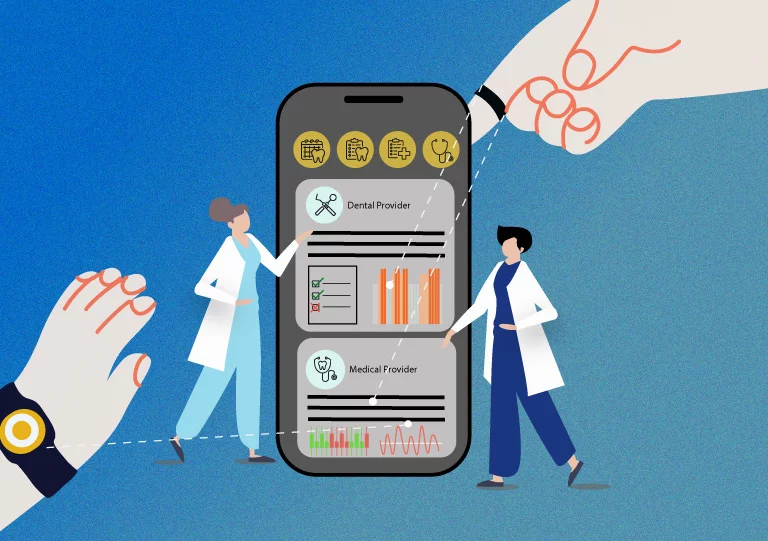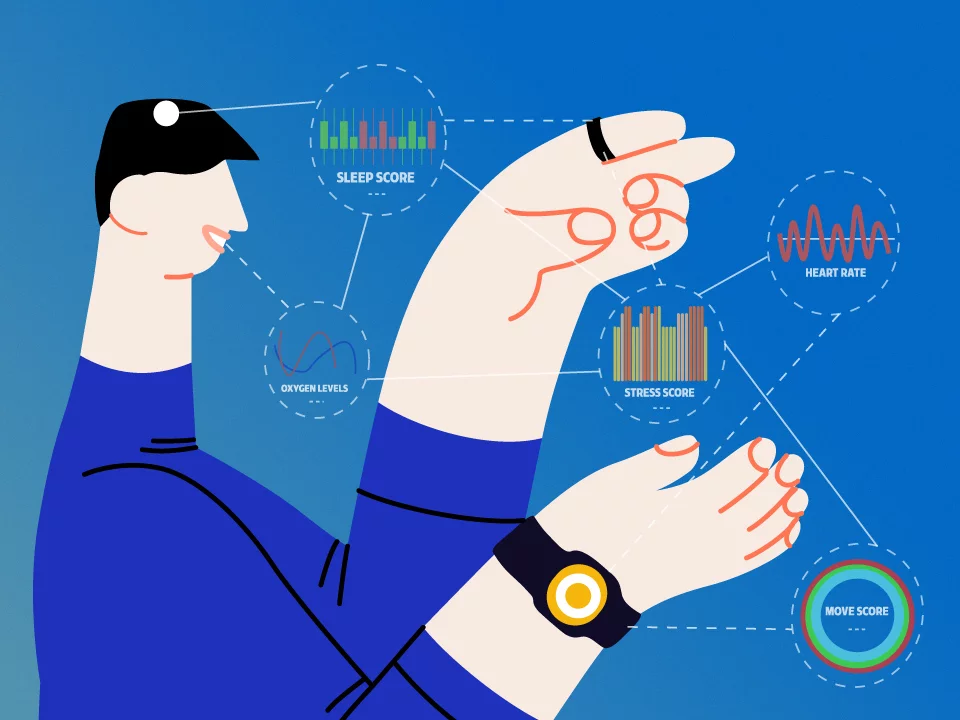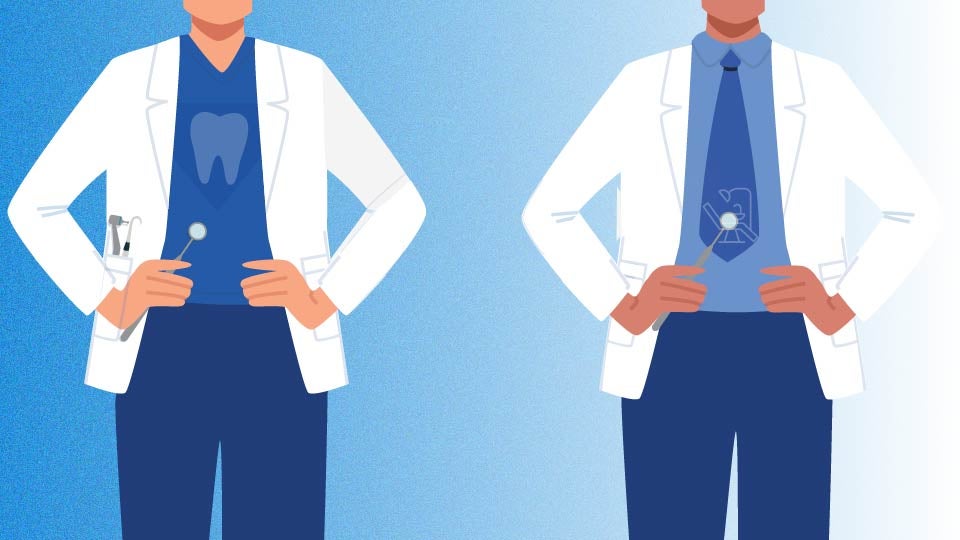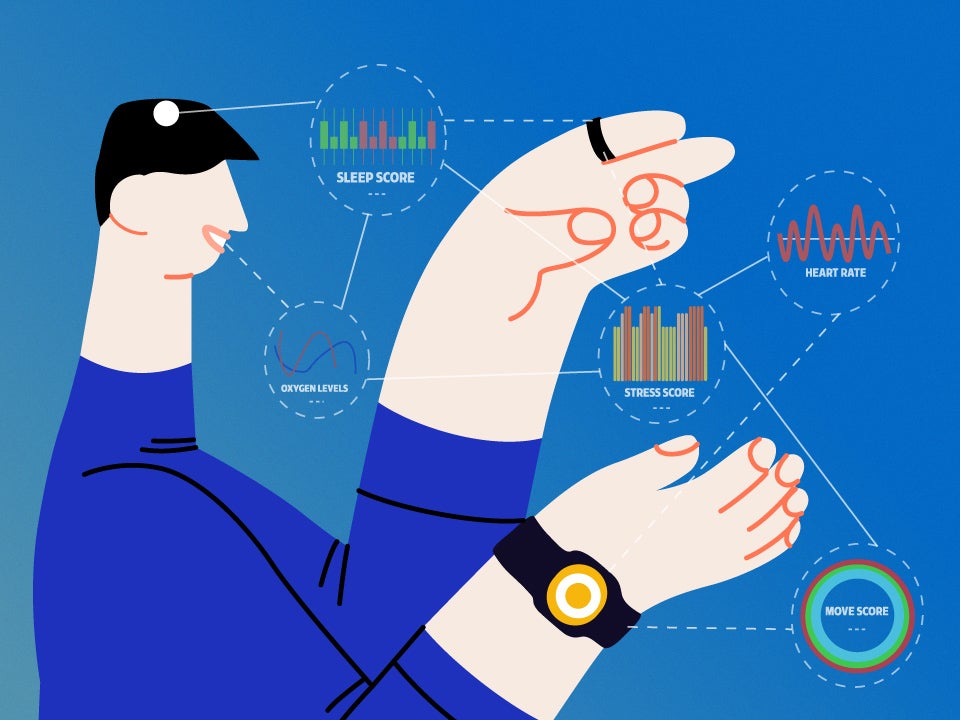Wearable technology in your shoe can track every step1 you take. The watch on your wrist can measure your heart rate2. A specially tricked-out contact lens can warn you of rising blood sugar3.
The world of data gathering is so rich, that researchers are now putting their tech where their mouth is.
Technology worn in or near the mouth4 can give people valuable personal health data, including information about the quality of their sleep5, which is an important factor in brain health. Researchers have long suggested that poor-quality sleep6 puts us at increased risk of dementia, but how do you know if you’re getting the quality sleep your brain needs? Wearable technology may soon provide those insights, all from the comfort of your own bed, without having to access sleep centers7.
Technology and Its Impact on Overall health
The Mouth-Body Connection® refers to the relationship between your teeth and gums and the rest of your body’s health. This usually describes how keeping your teeth and gums healthy may prevent the types of bacteria from forming in your mouth that can affect your heart health9, brain health10 or even your risk for developing cancer11.
The world of personal medical data-gathering adds a whole new dimension to the Mouth-Body Connection. For example, a small transmitter on a retainer-like device is being developed to both detect and treat12 sleep apnea, a condition in which a person temporarily pauses in breathing during sleep, either for a few seconds or even several minutes throughout the night.

Overall Health All in One Place
Even without high-tech wearables, data-gathering tools can enhance your understanding of whole-body health. Our Innovation team developed the Patient Dashboard which streamlines patient information into one easy-to-access location. By integrating medical records from primary care doctors, specialists, and dentists, this tool provides a more complete view of a patient’s health.
The Patient Dashboard helps both their doctors and dentists make the most informed recommendations and empowers patients with the knowledge and information they need to make more informed decisions.
For example, there is a known link between tooth loss and increased risk of dementia13, both because bacteria from gum disease may affect brain health and because neglecting oral health can be an early hint that someone is experiencing cognitive decline. With a complete health record, patients, doctors and dentists can look for clues about health issues that may be emerging – with the goal of treating those conditions early or even delaying or preventing them.
Wearing More than a Smile
Many of us already wear health data-gathering monitors on our wrists and carry them around with us on our phones. But the future of wearable technology may soon be in our mouths. Imagine a world in which mouthguards14 monitor our blood sugar to tell us our risk of developing diabetes and dementia15. Or retainers help optimize sleep for better brain health as we age.
The idea of noninvasive wearable tech in or near our mouths may one day arm us with the data we need to stay healthier and stave off the effects of Alzheimer’s disease? That’s tech that makes me smile.
Find your trusted, local dentist today!
Sources
Wu, J., Lee, M., Lu, C., Hu, H., & Tang, K. T. (2024). Accuracy and reliability of accelerometer-based pedometers in step counts during walking, running, and stair climbing in different locations of attachment. Scientific Reports, 14, Article 78684. https://www.nature.com/articles/s41598-024-78684-w
Ali, M., Al-Busaidi, I. S., & Al-Maqbali, M. (2024). A scoping review on advancements in noninvasive wearable technology for heart failure management. NPJ Digital Medicine, 7, Article 1268. https://www.nature.com/articles/s41746-024-01268-5
Kim, J., Park, J., Kim, M., et al. (2024). In-depth correlation analysis between tear glucose and blood glucose using a wireless smart contact lens. Nature Communications, 15, Article 47123. https://www.nature.com/articles/s41467-024-47123-9
Alobaid, F., Assery, M., & Aldhorae, K. (2023). Wearable orofacial technology and orthodontics. Dentistry Journal, 11(1), 24. https://www.ncbi.nlm.nih.gov/pmc/articles/PMC9858298/
Cleveland Clinic. (n.d.). Oral appliances for sleep apnea. https://my.clevelandclinic.org/health/treatments/21129-oral-appliance-therapy-for-sleep-apnea
National Institutes of Health. (2021, April 20). Lack of sleep in middle age may increase dementia risk. https://www.nih.gov/news-events/nih-research-matters/lack-sleep-middle-age-may-increase-dementia-risk
American Academy of Sleep Medicine. (n.d.). Undiagnosed and untreated sleep disorders: Barriers to care. https://aasm.org/undiagnosed-and-untreated-sleep-disorders-barriers-to-care/
Harvard Health Publishing. (n.d.). Gum disease and the connection to heart disease. Harvard Medical School. https://www.health.harvard.edu/diseases-and-conditions/gum-disease-and-the-connection-to-heart-disease
Harvard Health Publishing. (n.d.). Oral health problems may raise cancer risk. Harvard Medical School. https://www.health.harvard.edu/cancer/oral-health-problems-may-raise-cancer-risk
Sleep Foundation. (2023, June 20). FDA clears first oral appliance for severe sleep apnea therapy. https://www.sleepfoundation.org/sleep-news/fda-clears-first-oral-appliance-for-severe-sleep-apnea-therapy
National Institute on Aging. (2021, July 8). Tooth loss in older adults linked to higher risk of dementia. https://www.nia.nih.gov/news/tooth-loss-older-adults-linked-higher-risk-dementia
Kim, J., Iwai, Y., Lee, S. H., & Rogers, J. A. (2020). A wearable cellulose acetate-coated mouthguard biosensor for in vivo salivary glucose measurement. Analytical Chemistry, 92(19), 13689–13696. https://pubs.acs.org/doi/10.1021/acs.analchem.0c01201
Alzheimer's Society. (n.d.). Diabetes and the risk of dementia. https://www.alzheimers.org.uk/about-dementia/managing-the-risk-of-dementia/reduce-your-risk-of-dementia/diabetes
Smile Generation blog articles are reviewed by a licensed dental professional before publishing. However, we present this information for educational purposes only with the intent to promote readers’ understanding of oral health and oral healthcare treatment options and technology. We do not intend for our blog content to substitute for professional dental care and clinical advice, diagnosis, or treatment planning provided by a licensed dental professional. Smile Generation always recommends seeking the advice of a dentist, physician, or other licensed healthcare professional for a dental or medical condition or treatment.





